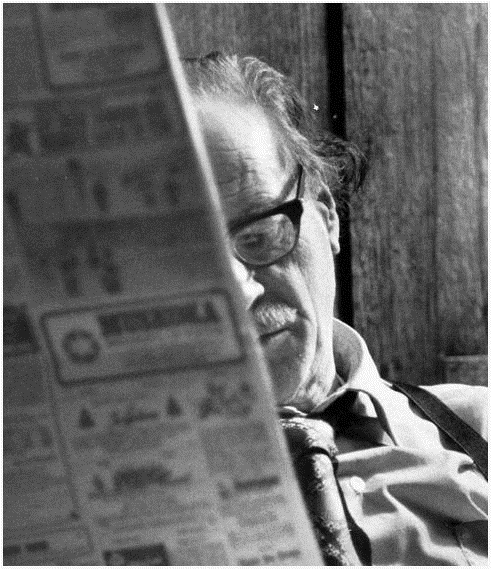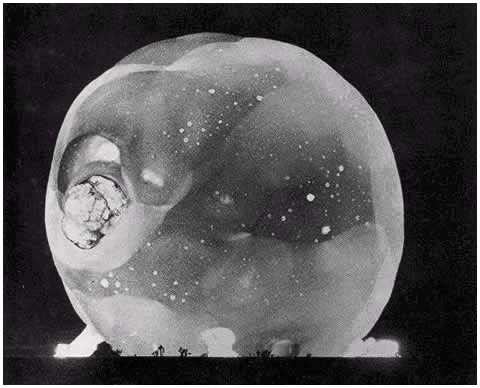You Know Nothing of My Work!
Douglas Coupland
(Atlas & Co.)

Radio? It was hot. Being pictureless, you and I had to use our brains to fill in the void, picture what was going on in those endless radio dramas and adventure stories ("Lights Out!" "Jack Armstrong, the All-American Boy," the Lux Radio Theatre which converted hour-and-a-half long movies into a one-hour pictureless radio drama every Sunday night ... narrated by Cecil B. DeMille himself.)
There were other beautiful insights from McLuhan. The light bulb? "Pure Information." Smell? The strongest sense of them all. His chapter in Understanding Media was called "The Scent of Time" and he went all the way back to Ming Dynasty China to recall that in royal palaces the candles were constructed in layers, with different scents in the wax so you would know, just by sniffing, what time it was.
Much was made of McLuhan's most memorable ideas about print, how Gutenberg's moveable type changed once and for all, the way we chopped and processed information. Before then, he wrote, the secrets of wisdom were hidden away in hand-written volumes of the priests. When print culture finally made its appearance, culture, ideas and information were available to all ... the religious folk no longer had a monopoly on knowledge.
I remember being down at the University Bookstore back in 1964 looking through the arts and science section and picking up Understanding Media. I remember not quite getting it even though I did take note of the chapter on telephones. McLuhan said that children were our guides on this and other media. When children talk on the telephone they always, he said, look down at the receiver (in those days, telephones were rather lunky affairs. (And, speaking of the scent of time --- you would know if the person using the telephone just before you was a smoker or not: you could smell the nicotine on the receiver).
He wrote that children looked at the receiver because the sound quality was so limited, cut-off around 5 kc --- whereas our hearing, especially for the young, could go as high as 20 kc. Children were thus looking down at the receiver and using their eyes to resolve the crummy sound.
"Interesting," I thought, and then I went off to work. Two hours later, after it all had percolated, I went back to the University Book Store and bought the book. That evening, I wrote a long fan letter to McLuhan, which he never responded to, at least not yet (he still may be floating around out there trying to figure out how to typeset and broadcast the universe).
I didn't find out until I read this book that McLuhan wouldn't be answering my fan letter any time soon. He was inundated. He had become the "Media Guru." The Master himself had indeed become the message --- and the messenger. "In 1967 he was named Albert Schweitzer Professor of the Humanities at New York's leading Catholic college, Fordham University. This one-year commitment came with a grant of $100,000 of which $60,000 was to cover the costs of personnel and facilities." Coupland calls it a "dream grant that allowed Marshall the freedom and budget to investigate anything he chose."
McLuhan was, as Coupland reports, singularly disinterested in the worth (or lack of worth) in the media. "He didn't ascribe any moral or value dimensions to it at all --- he simply kept on pointing out the effects of new media on the individual."
- There are, perhaps, no practical political, religious, or financial applications to Marshall's work. It could even be argued that it should be seen as a rarefied artifact unto itself, an intricate and fantastically ornate artwork that creates its own language and then writes poetry with it ... An artist, according to Marshall, is someone on the frontiers of perception, who looks at information overload with the goal of pattern recognition, to see things before anyone else.
McLuhan was an artist, and I suspect that Understanding Media --- my own favorite of all his books --- was an epic poem (and the hero was the media).
I included McLuhan's book in a communications class that I once taught at a local university, much to the annoyance of my students. They told me in various ways, that they didn't get it. Just to muddy the waters, one year I had the students read Understanding Media backwards; that is, we started with the last chapter the first week, and worked our way back to chapter one. And, hell, don't ask me why ... it just didn't work. I suspect that, like a Shakespeare play, it was all of a piece, and it came together in a strangely disorderly orderly way. (After that we read it sequentially, just as the author had set it up.)
Marshall McLuhan is not a bad book, although, like McLuhan, it does have its sillinesses, He could be silly for a reason. I'm not so sure about Coupland. He copies whole pages from ABE books about current sales information on McLuhan's books, and I can't exactly figure out why, except to pad out the book a bit (it is a bit slim).
Coupland also can get a little overwrought --- something that rarely, to my knowledge, happened to McLuhan. In the first chapter of Marshall McLuhan, Coupland waxes prolix about the problems facing us nowadays with the media and Google "and porn and gossip sites."
- Now your voice is that of a perpetual nomad drifting along a melting landscape, living day to day, expecting everything and nothing.
There are a plethora of stories here about McLuhan the man that fill in the gaps for those of us who never knew (or much cared to know) the facts of his life. He converted early on in his life to Catholicism. He irritated his fellow professors mightily ... evidently he floated around the campus in a haze, communicating brilliantly (or not at all) with his students.
I don't think that what his fellow professors thought about him, what happened in his later life should concern us. There are many jewels that appear here, however. McLuhan said that war, especially as it appeared on television, was "a form of education."
He was the one to coin the phrase, "The Living Room War," which Michael Arlen later used as the title of his vivid book on TV.
Best of all, we're given this joke (McLuhan was notoriously fond of puns and awful jokes):
